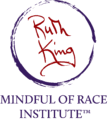Imagine Trayvon Martin, 17, trapped, masking his powerlessness with a pumped up ego yet convinced that his life was about to end. What would you do? How might you feel? Have you ever felt this trapped or looked death in the eyes? How was your powerlessness felt and expressed? How are you living with your choices today?
You might also imagine being George Zimmerman, 28, armed, on the hunt, focused in on a target. A choice is made. Imagine the rush and fear of that moment just before the trigger is pulled. Have you ever felt anything similar—Perhaps as a parent, leader, boss or partner, where you had the upper hand, the authority, or the law on your side? How did it feel? How was your power expressed? How are you living what your choices today?
Whether victim or perpetrator, Trayvon and George belong and we’re all affected, perhaps unknowingly, by such widespread tragedies. My father was murdered by his girlfriend in a jealous rage. He was 50, at the prime of his life. I was 17 and it took decades before I could acknowledge the impact of this devastation and recognize the many ways it had shaped my life and those that dared to love me. Despite many such blows, my yearning to love was greater than my fear.
I believe we exist in a unique cell suit within an infinite, skinless body held together by the loving gravity of Mother Earth. We are in a homeopathic relationship where each cell self represents the whole of existence. We are in proprioceptive relationship—one vast nervous system requiring caring attention for universal clarity and stability. Collectively we are sacred geometry, a holographic constellation—an exquisite miracle constantly evolving in meaning. As a cell self, we have inherent wisdom that serves the whole of existence. What we do matters. The more we wake up to our belonging, the more potent our existence and the less likely we are to do harm.
In Buddhist traditions, belonging is beautifully expressed in the aspiration of the Bodhisattva: May all life be of benefit to all beings. More pointedly: May my life and practice relieve the suffering in the world. This aspiration, which I aspire, has recently led me to explore such questions as:
1. How do I work with my thoughts and beliefs in ways that nurture the dignity of all life?
2. How do I ensure justice without fostering harm and hate?
3. How do I comfort my raging hearts in a sea of ignorance and violence?
4. How can my actions reflect the world I want to live in and leave to future generations?
As I slow down and soften my hard impulses, I feel more open and pliable. There is more inner space to be, and I can consider more wholesome options like: What could I do that would…
- be respectful and minimize pain and suffering?
- acknowledge my contribution to the suffering in this situation?
- enhance humanness, intimacy, and connection with this person or this situation?
- plant wholesome generational seeds?
- reflect my aspiration for wellbeing for all?
I fall short often. I get caught in waves of righteous indignation and collapse into fears that trigger a false front. Yet I feel hopeful. Through mindfulness and compassion practices, I can acknowledge the pain I am experiencing as a human experience. I can tolerate what is happening with more kindness; let go, forgive, and take refuge in my own skin. Increasingly, I can recognize myself in most situations and even find myself laughable. This growing inner-shift doesn’t eliminate suffering but it helps me greet suffering with a deep respect for life.
